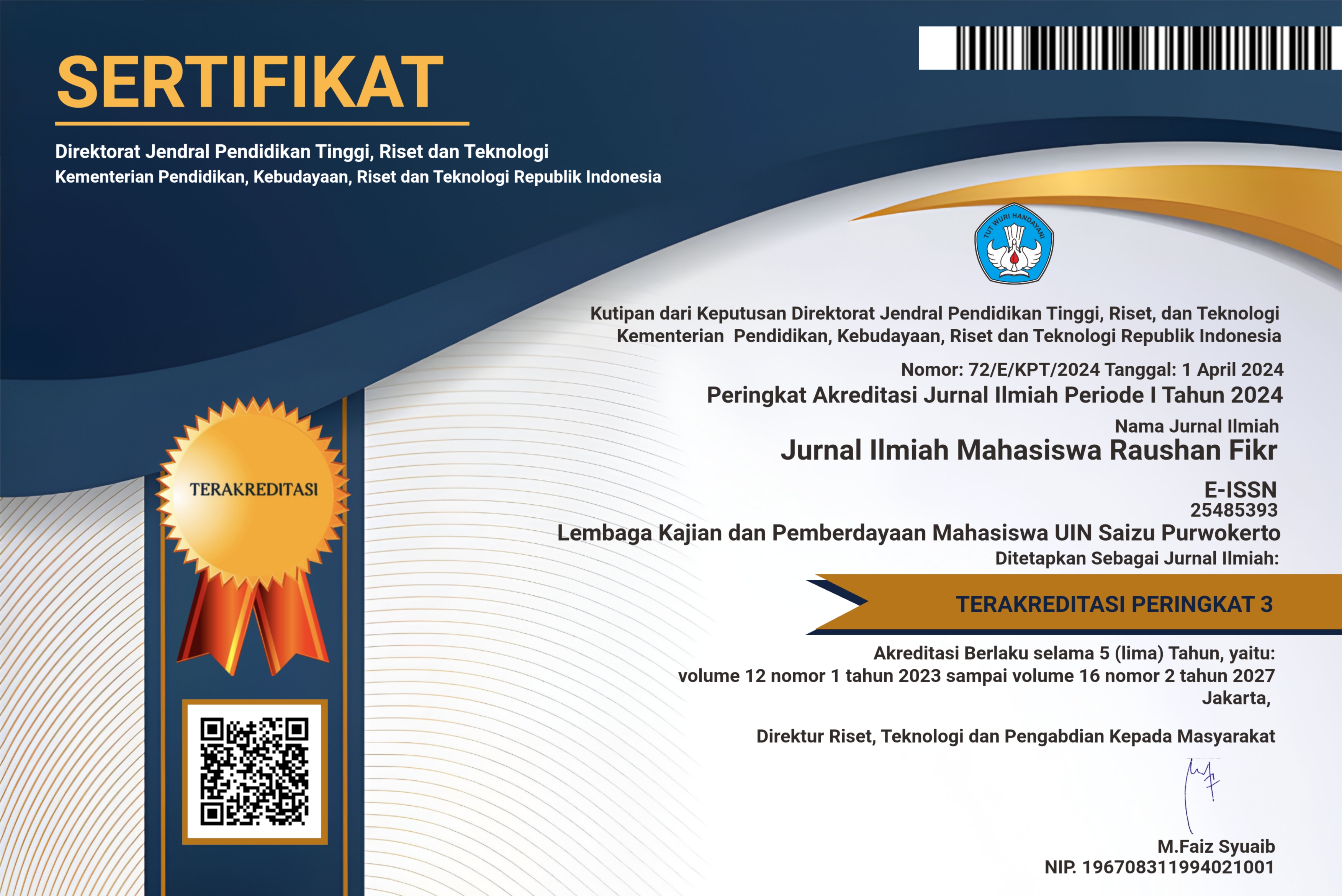Islamic Communication Ethics in Social Media Information Services
DOI:
https://doi.org/10.24090/jimrf.v13i1.11018Keywords:
Islamic Communication Ethics, Information Services, Social MediaAbstract
The rising influence of social media has led to an increasing need for effective communication strategies across different sectors. This research examines the application of sharia-based communication ethics in providing information services through social media, particularly focusing on their impact on community engagement and local tax administrators. A mixed-methods approach is used, integrating qualitative interviews with social media analysis to assess the effectiveness of communication ethics such as qaulan baligha, qaulan syadida, qaulan layyina, qaulan karima, qaulan ma'rufa, and qaulan mashura. The findings reveal that while targeted and persuasive communication models (qaulan baligha) are implemented, overall user engagement remains low. Transparent communication (qaulan syadida) improves public trust, while respectful and courteous communication (qaulan layyina and qaulan karima) promotes positive interaction. Additionally, clear and easily understandable communication (qaulan ma'rufa and qaulan mashura) supports efficient information delivery. These results suggest that incorporating these communication ethics can enhance both information dissemination and public engagement on social media platforms.Downloads
References
Alnuaimi, A. J., & Azzi, A. (2022). Islamic Ethics & Social Media Use: A Study in Theory & Practice. Journal of Positive School Psychology, 2022(3), 6698–6710. http://journalppw.com
Apdillah, D., Harmika, Z., Sahera, M., & Harahap, H. U. (2022). Communication Ethics As Virtual Virtue Control in Media Behavior Society in the Digital Age. Journal of Humanities, Social Sciences and Business (Jhssb), 1(3), 49–60. https://doi.org/10.55047/jhssb.v1i3.148 DOI: https://doi.org/10.55047/jhssb.v1i3.148
Djamdjuri, D. S., & Holisah, F. (2021). The Importance of Ethics in Communication Toward Children: An Islamic Overview. Al-Aulad: Journal of Islamic Primary Education, 4(2), 60–66. https://doi.org/10.15575/al-aulad.v4i2.11096 DOI: https://doi.org/10.15575/al-aulad.v4i2.11096
F, P. K. (2013). Introduction to Social Research–Quantitative & Qualitative Approaches. Sage Publications, Inc.
Gustam, R. R. (2015). Karakteristik Media Sosial dalam Membentuk Budaya Populer Korean Pop di Kalangan Komunitas Samarinda dan Balikpapan. E-Journal Ilmu Komunikasi, 3(2), 224–242.
Kahar, N. A. (2021). Pelayanan Perizinan Berbasis Aplikasi E-Lebbami Pada Kantor Pelayanan Perizinan Administrasi Kota Makassar. PhD Thesis, UNIVERSITAS NEGERI MAKASSAR.
Lubis, M. S. I., Nst, A., & Sabaruddin S, S. S. (2022). Moderation in Islamic Communication Perspectives of Tadabbur AlQur’an. Dharmawangsa: International Journal of the Social Sciences, Education and Humanitis, 3(1), 16–22. https://doi.org/10.46576/ijsseh.v3i1.2974 DOI: https://doi.org/10.46576/ijsseh.v3i1.2974
Majid, N. A., Abdullah, N. N., Amirul, A., Ali, E. R., Ramli, M. S., & Ayob, N. H. (2024). Exploring The Interplay between Undergraduates ‘ Perception of Islamic Communication Ethics and Their Practice in Assertive Communication. 14(6), 22–34. https://doi.org/10.6007/IJARBSS/v14-i6/21542 DOI: https://doi.org/10.6007/IJARBSS/v14-i6/21542
Marwah, N. (2021). Etika Komunikasi Islam Al-Din. Jurnal Dakwah Dan Sosial Keagamaan, 7(1), 3–6. https://doi.org/http://dx.doi.org/10.35673/ajdsk.v7i1.1704
Moelong. (2019). Metodologi Penelitian Kualitatif. PT Remaja Rosdakarya.
Muslimah. (2017). Etika Komunikasi Dalam Persfektif Islam Sosial Budaya (Vol. 13, Issue 2, pp. 115–125).
Prasetya, E. (2021). Pengaruh Terpaan Podcast Noice Musuh Masyarakat Episode 12 Terhadap Sikap Empati Mahasiswa (Studi Pada Mahasiswa Ilmu Komunikasi UMM Angkatan 2018). PhD Thesis, Universitas Muhammadiyah Malang.
Prasetyo, E. (2019). Media Informasi Berbasis Web pada SMA Islam Al-Amalul Khair Palembang. Jurnal TIPS: Jurnal Teknologi Informasi Dan Komputer Politeknik Sekayu, 9(2), 10–19.
Qudratullah, Q., & Syukur, S. (2022). Implementation of the Code of Conduct of Radar Bone Journalists in Islamic Communication Ethics Perspective. … of the 1St …, 891–902. https://proceedings.uin-alauddin.ac.id/index.php/icsis/icsis_2021/paper/view/569
Rafinita, A. (2021). Etika Diseminasi Informaasi Dalam Perspektif Komunikaasi Islam dan Humanisme di Era Digitall. Jurnal Kopis: Kajian Penelitian Dan Pemikiran Komunikasi Penyiaraan Islam, 4(1), 10–16. DOI: https://doi.org/10.33367/kpi.v4i1.1731
Rahmadani Zein, P. (2022). http://infor.seaninstitute.org/index.php/infokum/index INFOKUM INFOKUM is licensed under a Creative Commons Attribution-Non Commercial 4.0 International License (CC BY-NC 4.0) Ethics of Using Social Media with Principle Islamic Communication. Journal, 10(5), 147–156. http://infor.seaninstitute.org/index.php/infokum/index
Sa, H., Diyah, ;, Biru, B., Panuluh, I., Sivana, C., & Maria, S. (2021). Social Media Ethics in the Context of Islamic Communication Review of the Qur’an and As Sunnah. Budapest International Research and Critics Institute-Journal (BIRCI-Journal), 4(4), 10247–10255. https://bircu-journal.com/index.php/birci/article/view/3061
Sadatmoosavi, Z. (2017). The Importance of Modesty Virtue in Islamic Communication; Ethics and Islamic Management. SSRN Electronic Journal. https://doi.org/10.2139/ssrn.2881192 DOI: https://doi.org/10.2139/ssrn.2881192
Sasmita, G. G. (2015). Rancang Bangun Media Informasi Bis umum di Terminal Purwokerto Berbasis Android (a Design of Media Information of Bus in Purwokerto Bus Station Android Based). (PhD Thesis, Universitas Muhammadiyah Purwokerto.
Solekhan, M. (2023). Communication Ethics in Social Relationships Using Social Media Wisely in Islamic Values. Journal of Modern Islamic Studies and Civilization, 1(01), 1–11. https://doi.org/10.59653/jmisc.v1i01.1 DOI: https://doi.org/10.59653/jmisc.v1i01.1
Sukrillah, A. (2018). Pemanfaatan Media Sosial Melalui Whatsapp Group FEI Sebagai Sarana Komunikasi. Jurnal Komunikatio, 3(2). DOI: https://doi.org/10.30997/jk.v3i2.919
Tengku, W., Faridah, & A. Fikri Amiruddin Ihsani. (2023). The Principle of Divinity in Islamic Communication Perspective. Mediakita, 7(2), 277–298. https://doi.org/10.30762/mediakita.v7i2.950 DOI: https://doi.org/10.30762/mediakita.v7i2.950
Tentang Bapenda–BAPENDA, n.d., https://bapenda.kaltimprov.go.id/tentang-bapenda/, accessed February 24, 2022. (n.d.).
“Undang Undang No 1 Tahun 2005 Pelayanan Publik - Penelusuran Google,” accessed July 14, 2022. (n.d.).
Wati, D. R. (2023). The Ethics of Social Media Communication in the Perspective of the Al-Qur’an. Journal of Islamic Communication and Counseling, 2(2), 93–107. https://doi.org/10.18196/jicc.v2i2.28 DOI: https://doi.org/10.18196/jicc.v2i2.28
Zaenuri, A. (2021). Islam dan Etika Komunikasi Di Media Sosial. JADID: Journal of Qur’anic Studies and Islamic Communication, 1(2), 183–199.
Zakki, Falani Achmad, Setiawan Eman, D. H. S. (2016). Implementasi Sistem Informasi Monitoring Dokumen Justifikasi (Studi Kasus: PT. Telkom Indonesia, Regional 5 Jawa Timur). Jurnal Insand Comtech, 1(2), 7–8. https://doi.org/http://dx.doi.org/10.53712/jic.v1i2.106
Downloads
Published
How to Cite
Issue
Section
License
Copyright (c) 2024 Suci Suliyanti, Tahir, Fuad Fansuri

This work is licensed under a Creative Commons Attribution-NonCommercial-ShareAlike 4.0 International License.
Authors who publish with this journal agree to the following terms:
- Authors retain copyright and grant the journal right of first publication with the work simultaneously licensed under a Creative Commons Attribution-NonCommercial-ShareAlike 4.0 International License that allows others to share the work with an acknowledgement of the work's authorship and initial publication in this journal.
- Authors are able to enter into separate, additional contractual arrangements for the non-exclusive distribution of the journal's published version of the work (e.g., post it to an institutional repository or publish it in a book), with an acknowledgement of its initial publication in this journal.
- Authors are permitted and encouraged to post their work online (e.g., in institutional repositories or on their website) prior to and during the submission process, as it can lead to productive exchanges, as well as earlier and greater citation of published work (See The Effect of Open Access).














